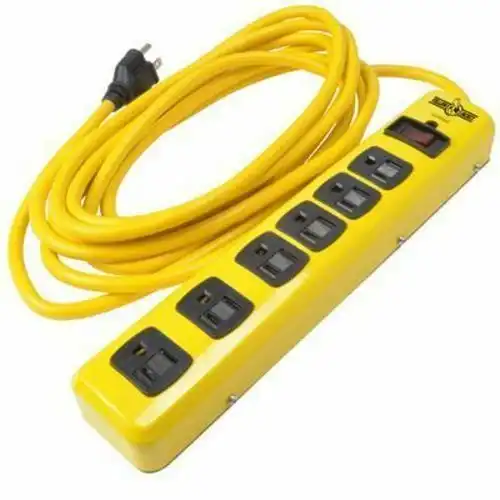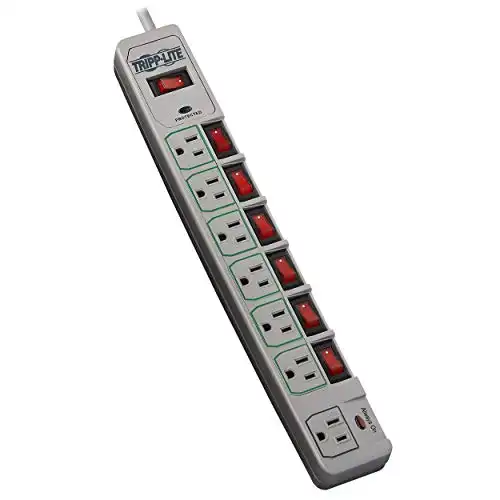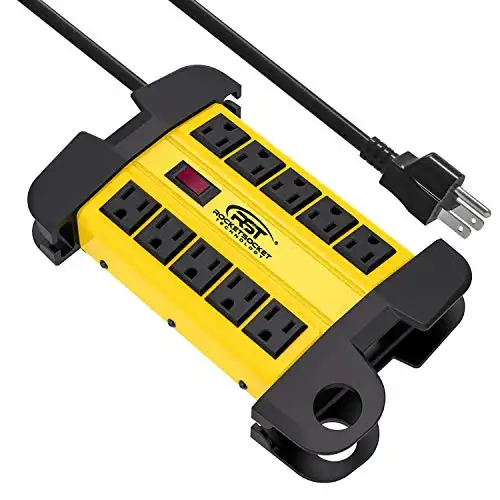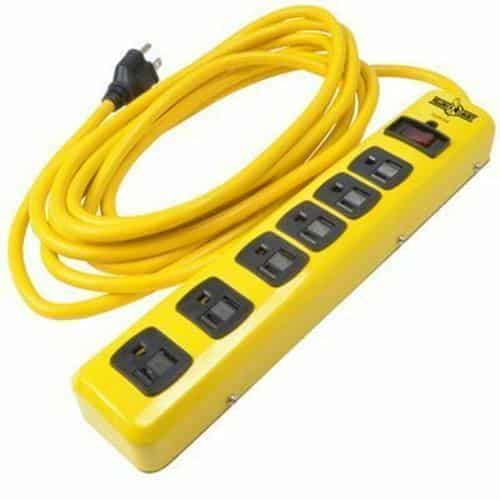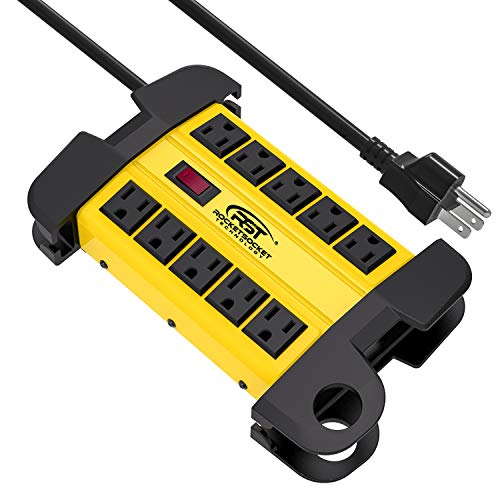Surge protectors are all the same, right? Why do you need a special one for your garage?
Let’s face it: your garage is a hostile environment for electronics.
You park your car in there after it rains or snows. Leaves and dust blow in from the outside, and you might cut wood with your table saw, blowing sawdust everywhere.
So when I needed to replace my garage surge protector, I ran several head-to-head tests to find the best one for my garage.
Let’s get started.
| Product Image | Product Name / Primary Rating | Primary Button |
|---|---|---|
|
||
|
||
|
||
|
Tripp Lite 7 Outlet (6 Individually Controlled) Surge Protector
Surge Protector vs. Power Strip
First, let’s get some terminology out of the way.
We may use the terms ‘power strip’ and ‘surge protector’ interchangeably, but there’s a difference between the two.
A power strip is simply several outlets attached to a switch that lets you turn all the outlets on or off at once. By contrast, a surge protector adds a circuit to help protect against electrical surges.
In theory, any surge will trip the circuit and blow out your surge protector instead of whatever is plugged into it.
It’s not necessary to ONLY buy surge protectors, although many people choose to.
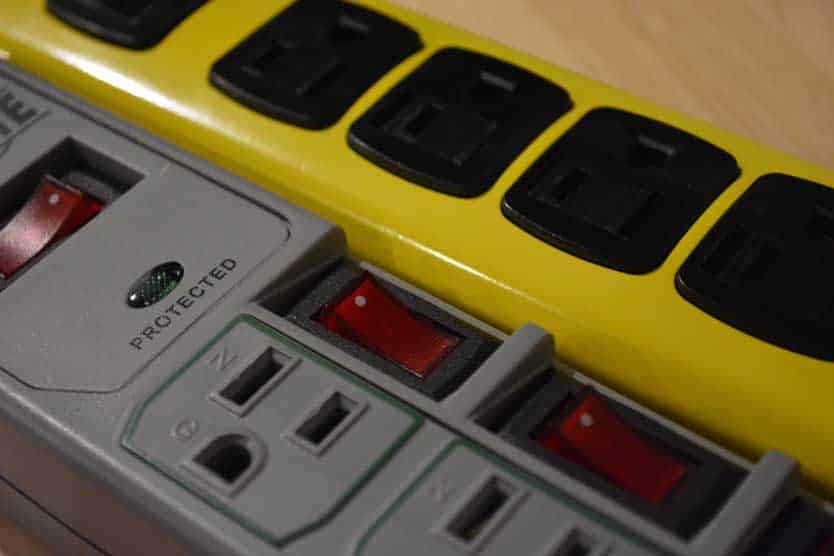
7 Things to Consider When Buying A Garage Surge Protector
1. Surge Rating (Joules)
Every surge protector is rated for how big a surge it can withstand, which is always written in joules (1080 joules, 2800 joules, etc.).
The bigger the number, the bigger a surge it can withstand.
Sensitive electronics like TVs or stereos should be connected to surge protectors with much higher joule ratings than inexpensive components like lamps.
2. Load Rating (Watts & Amps)
The second big thing to look for is the surge protector’s load rating, which is listed in total wattage and amperage.
We’ll get into more detail down below in the section on safety. Make sure your garage surge protector is rated for more amps and volts than the devices you plug into it.
This is especially true if you’re plugging several LED garage ceiling lights into your power strip. Too much power can quickly overload your surge protector.
3. UL or ETL Certification

Look for the Underwriters Laboratories (UL) or Electrical Testing Laboratory (ETL) logos on any surge protector you buy.
Both are independent labs that ensure the product meets minimum safety standards. Make sure your garage surge protector passes one of these standards.
4. Outlet Spacing
There’s nothing more frustrating than trying to plug something into your surge protector, and the plug won’t fit. Many devices have extra-large power bricks or AC adapters that get in the way of the outlets next to them.
Try to think of what you’re plugging into the surge protector before buying the wrong style.
5. Cord Length
Here’s another logistics piece that we don’t often think about. Most garages have only one or two GFCI outlets, and they’re usually not in the most convenient places.
For safety reasons. manufacturers do not recommend plugging a surge protector into an extension cord. Make sure you buy a surge protector with a long enough cord to get to where you need it.
6. Does It Have Insurance?
Many surge protectors have an insurance policy if a surge somehow gets through and damages your stuff.
It’s more common for surge protectors designed for your electronics or computer gear to have insurance than heavy-duty garage surge protectors. Still, it could be the tie-breaker if you’re trying to decide between two similar products.
7. Surge Protectors Don’t Last Forever
While there’s no hard-and-fast rule to say how long a surge protector is supposed to last, most experts agree that the average lifespan is around two to three years. That could be much less if you live somewhere with a lot of lightning.
A surge protector works by diverting the excess electricity (the surge) to eliminate the excess current and divert the rest to the ground wire. (source)
The trouble is that those components degrade over time, lessening your surge protection with each use until they finally (and catastrophically) fail.
The Best Garage & Workshop Surge Protectors
If there’s no clear-cut “best product” for whatever I’m shopping for, I like to buy a couple of the top contenders and have my own head-to-head comparison.
That’s what I’ve done here.
I looked at all the heavy-duty surge protectors I could find, chose what I considered the top four candidates, and then bought them all to see the best garage surge protector.
Here are the four finalists, along with some critical specs and images. In the end, I’ve listed my favorite as well as a backup choice.
Best Overall Surge Protector: Yellow Jacket 5138

I won’t bury the lead on this one. The Yellow Jacket 5138 is easily my favorite garage surge protector for the price.
It’s a heavy-duty steel casing with a plastic backing panel that feels like it could take a beating in a garage and not miss a beat.
The six outlets all have dust\and debris shields that you can quickly close with your fingertips when the outlet isn’t in use. Each outlet is set at 90-degree angles to the surge protector and arranged in a 4+2 pattern with two outlets near the bottom for your larger AC adapters.
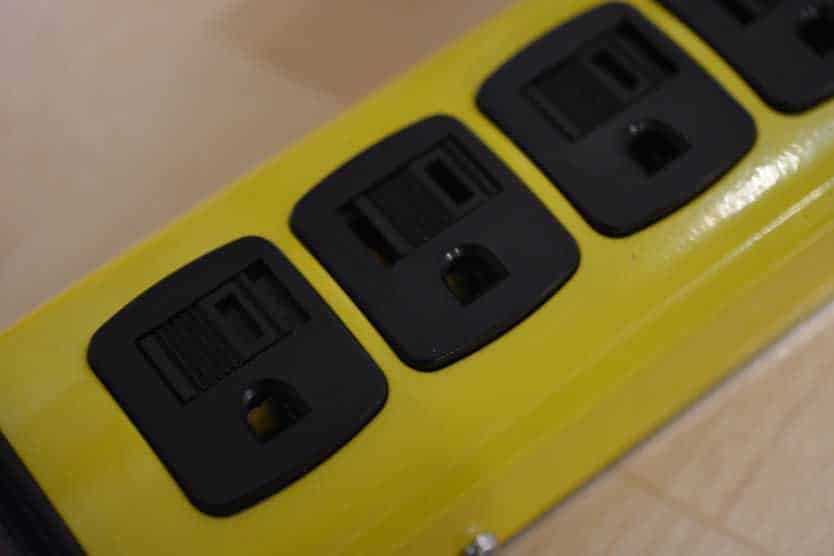
There’s a green “Protected” light showing that the surge suppression is working correctly and a lighted power switch with a good, solid feel when you flip it off and on.
The cable is an extra-long 15 feet long
| Joule Rating | 1440 Joules |
| Maximum Line Current | 15 Amp/1800 Watts |
| # of Outlets | 6 (4 + 2) |
| Cord Length | 15′ |
| Weight | 2 lbs, 4 oz |
| Material | Steel\Plastic |
| Certification | UL |
| Insurance | No |
I really can’t say enough good things about the Yellow Jacket 5138. It’s solid enough that I never worry about accidentally hitting it or dropping something heavy on it accidentally. It’s got a high enough joule rating and can take most surges that come its way.
Overall, this a great surge protector at a reasonable price and easily my favorite general-use garage surge protector.
Best Value Garage Surge Protector: BESTTEN Workshop Surge Protector
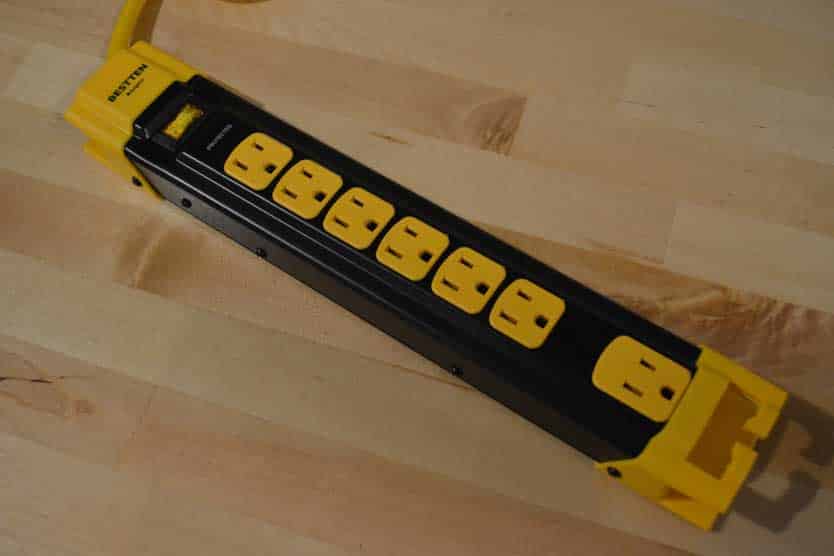
Pound for pound, the Yellow Jacket 5138 is better than the BESTTEN Workshop Surge Protector.
The BESTTEN only protects up to 600 joules. It’s got a metal case with plastic caps, but it’s obviously a lower gauge metal than the Yellow Jacket. The cord is shorter too (9 ft compared to 15 ft).
So why is it on this list?
What I like about the BESTTEN is that it feels like it’s designed to be portable. It’s only 1 lb, 11 ounces, making it less than half the weight of the Yellow Jacket.
The plastic caps are notched so you can wrap the 9′ cord around the unit’s entire length. The only drawback is that the plug doesn’t have a clip on the back to attach to the cord. This seems like an obvious miss in their design.
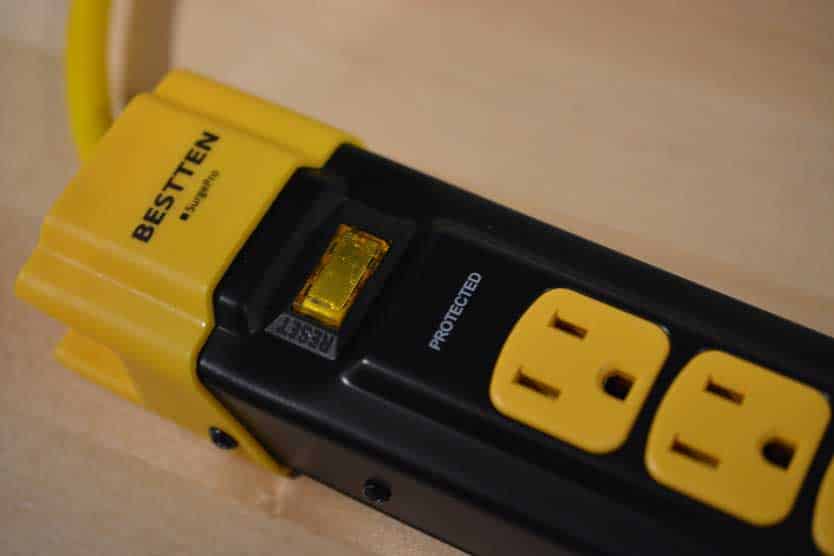
The seven outlets are laid out in a six-plus-one design that allows large power adapters to use the last outlet and not interfere with any other plugs. However, the outlets do not have any dust or moisture shields.
The metal housing wraps around three of the four sides, with the back side still being plastic. There are four small screw mounting holes on the back as well.
| Joule Rating | 600 Joules |
| Maximum Line Current | 15 Amp/ 1875 Watts |
| # of Outlets | 7 (6 + 1) |
| Cord Length | 9′ |
| Weight | 1 lb, 11 oz |
| Material | Metal\Plastic |
| Certification | ETL |
| Insurance | No |
Overall, the BESTTEN Workshop Surge Protector is decent enough quality. Still, it pales in comparison to the similarly priced Yellow Jacket.
The BESTTEN is a good option if you want to spend as little as possible or you need something extremely portable. Otherwise, go with the Yellow Jacket 5138.
Best Upgrade Garage Surge Protector: Tripp-Lite TLP76MSG

The Tripp-Lite TLP76MSG isn’t designed for garages, but it’s got some cool features that earn it a spot on this list.
Let’s talk about the switches first. There are a total of seven (7!!!!) of them on this surge protector, including a master switch at the top, above the surge protection warning light.
As part of the Eco-Surge lineup of surge protectors, six of the seven outlets are ALSO individually switched! Tripp-Lite estimates this would save approximately $75 in energy costs over the three-year lifespan of this garage surge protector.
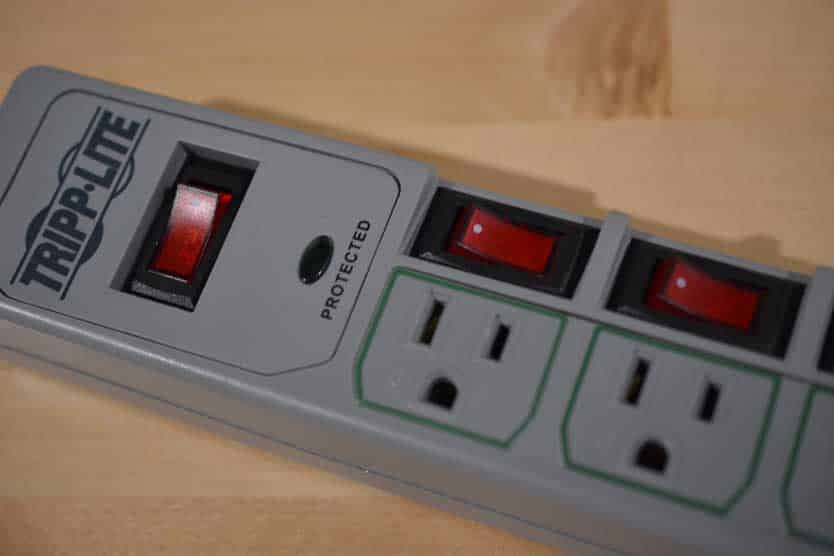
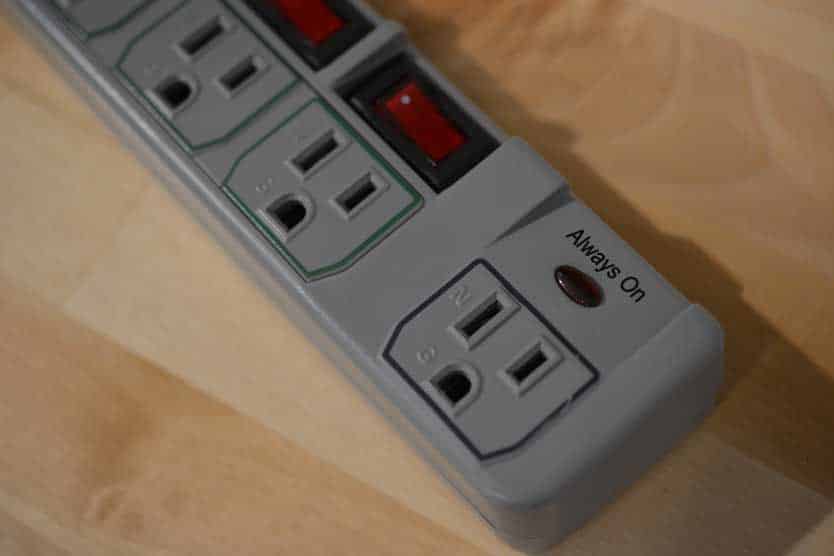
That’s a cool feature to prevent “energy vampires” from increasing your electric bill.
| Joule Rating | 1080 Joules |
| Maximum Line Current | 15 Amp/1800 Watts |
| # of Outlets | 6 (5 + 1) |
| Cord Length | 6′ |
| Weight | 1 lb, 9 oz |
| Material | Plastic |
| Certification | UL |
| Insurance | $25,000 |
My one complaint with this surge protector is that it’s only a plastic casing instead of a metal one. Otherwise, I am a massive fan of Tripp-Lite’s products.
In my experience, they’ve always had high build quality and were worth every penny.
- 6 Outlets With Individual On/Off Switches to Cut Power to Devices Not Being Used.
- 1 Additional Outlet That Stays Powered On For All Essential Devices
- High Joule-Rating Conforms to UL 1449 Safety Standards
- 6 foot AC Power Cord with NEMA 5 15P Plug
- Keyhole Slots on Bottom Panel Provides Convenient Wall or Desk Mounting Option
Best Heavy-Duty Surge Protector: CRST LTS-10TS
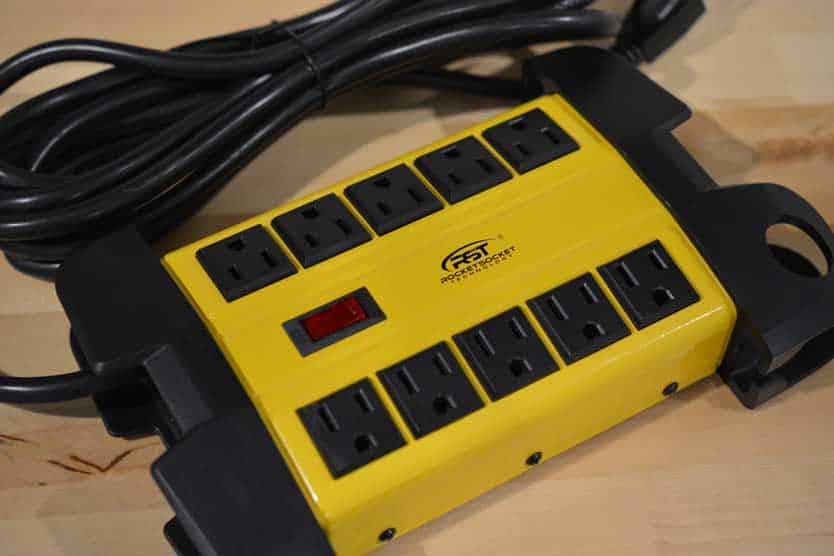
The biggest garage surge protector on this list is the CRST LTS-10TS, weighing in at three-and-a-half pounds.
The casing is entirely made of metal except for the black plastic caps. Like the BESTTEN surge protector, the caps serve as a built-in way to wrap the cord without it getting in the way.
The ten outlets are arranged in a 90-degree pattern, five on each side of the rectangular casing. The casing is angled slightly away from the center, preventing plugs on one side from interfering with the opposite side’s plugs.
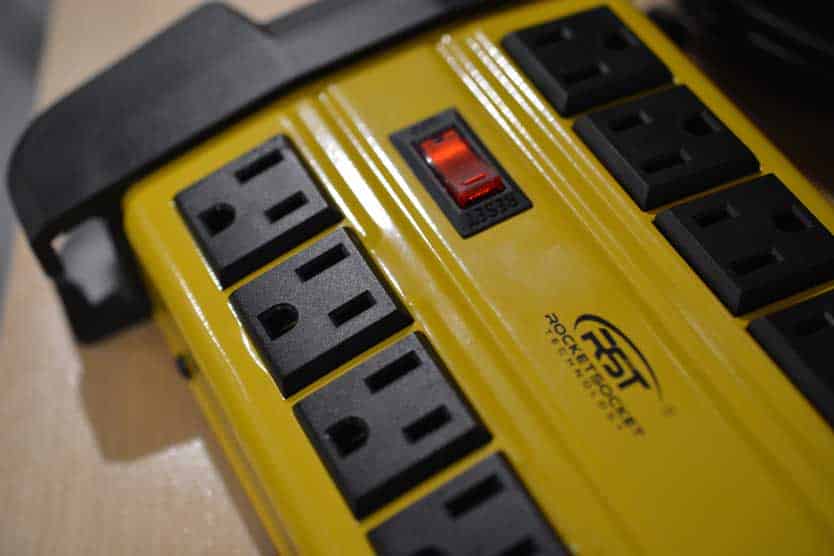
One drawback is that there are no wide-spaced outlet slots, so if you have a large AC adapter, you won’t be able to use the outlets next to it. Similar to most of the garage surge protectors on this list, there are no debris shields on the outlets.
| Joule Rating | 2800 |
| Maximum Line Current | 15 Amp/1875 Watts |
| # of Outlets | 10 |
| Cord Length | 15′ |
| Weight | 3 lbs, 4 oz. |
| Material | Metal |
| Certification | ETL |
| Insurance | No |
I can’t justify the extra cost for my needs because I try to only have a few things plugged into an outlet simultaneously.
Suppose you have a ton of regular-sized plugs that you need to have all connected simultaneously. In that case, the CRST LTS-10TS is a great heavy-duty surge protector. However, the moment you need to plug in large AC adapters, it starts to lose its luster.
Surge Protector Safety
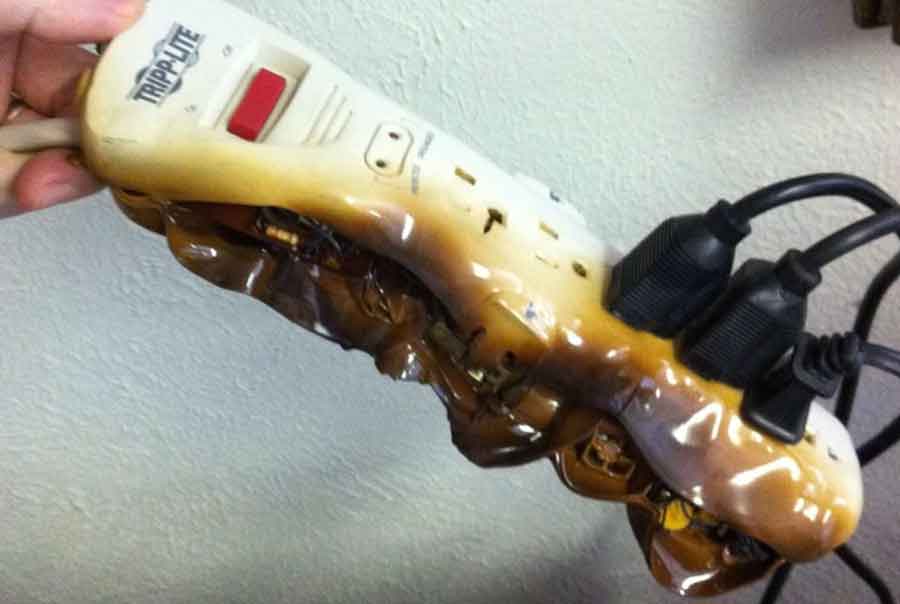
The US Consumer Product Safety Commission found that about 4,000 injuries are treated in US hospital emergency rooms due to electric extension cords and surge protectors. (source)
Some devices, like garage heaters, microwaves, or soldering irons, should never be plugged into a surge protector.
Just because your garage surge protector has six outlets doesn’t mean you can plug six devices into it!
Additionally, each surge protector, power strip, and extension cord will have maximum wattage and amperage ratings that you need to stay below. You must pay attention to both.
Let’s run through an example:
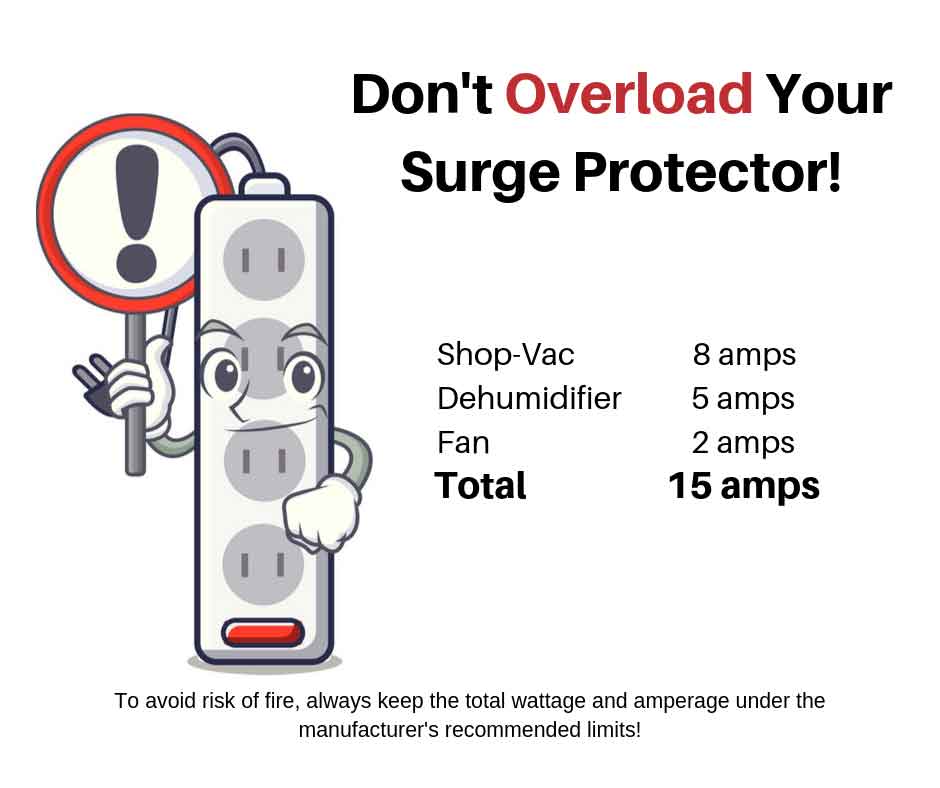
Three of my garage’s most commonly used devices could overload a small garage surge protector by themselves.
My Air King industrial fan draws 2.2 amps at high speed, and my garage dehumidifier draws just under 5 amps when it’s running. If I vacuum out my car while both are running, I could easily overload my garage surge protector.
Wrapping It Up
Of all the garage surge protectors that I tested, my favorite is the Yellow Jacket 5138, which also happens to be one of the cheapest.
It doesn’t often work out that way, but it’s really cool when it does.
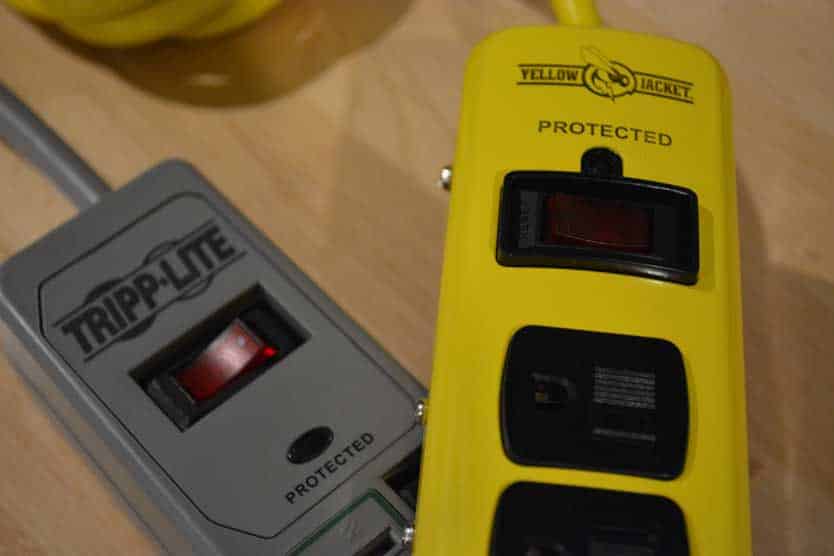
The Yellow Jacket has a lot going for it:
- Steel case.
- Debris shields on each outlet.
- The longest length cord of all four models I tested.
You can’t really go wrong with this one.
My second choice would be the Tripp-Lite because of the individually switched outlets.
Sure, it’s the only plastic surge protector on this list, so it’s not as durable as any others. But I love to save money on my electric bill whenever possible and having a garage surge protector that helps me do that is a big win.
If you’re looking for a surge protector for your garage door opener, don’t worry. I’ve got you covered. You can check out my review and buyer’s guide here.
| Product Image | Product Name / Primary Rating | Primary Button |
|---|---|---|
|
||
|
||
|
||
|

